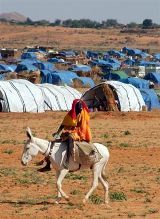Sudan to ease aid access to entire country
KHARTOUM, Nov 25 (Reuters) – Sudan on Thursday agreed to ease restrictions to humanitarian aid access throughout Africa’s largest country after a meeting with the Canadian prime minister in the Sudanese capital.

|
|
A displaced woman rides her donkey. |
Sudan agreed in May to cut through layers of red tape for aid equipment and to guarantee aid workers visas to try to solve the humanitarian crisis in Darfur.
The United Nations says the Darfur crisis is the worst in the world, with more than 1.6 million people driven from their homes during a 22-month-old rebellion.
Foreign Minister Mustafa Ismail Osman, asked if the eased Darfur procedures would apply to the whole of Sudan, said: “Yes, the president promised that any part of the Sudan which is in need of humanitarian support — there is no problem for the government to apply the same.”
He declined to say when the restrictions would be eased but said the president had taken the decision and only technicalities were left to organise.
The Canadian special envoy for peace in Sudan, Mobina Jaafer, said visiting Canadian Prime Minister Paul Martin welcomed the move.
“We were very pleased that the president went further and said that the fast-track humanitarian permits for Darfur they would try to implement the same all over Sudan,” Jaafer told a joint news conference with Osman.
Martin, on his first visit to Sudan, went to a refugee camp outside the capital on Thursday and said Canada would fund the chartering of 15 extra helicopters for the African Union force from Jan. 1 until the end of next August.
In remote Darfur, an area the size of France where there are few roads, helicopters are often the only form of transport for the African Union force, which is monitoring a shaky April ceasefire.
“We’ve provided the funding for another 15 helicopters. These helicopters are very important. These helicopters will be there to support the AU mission,” he told a news conference in Khartoum.
While violence in Darfur is on the rise and a ceasefire appears to be in grave danger, a final peace agreement is closer in the separate and bloodier conflict in Sudan’s south.
The southern civil war, Africa’s longest, has claimed 2 million lives and displaced more than 4 million over more than two decades. Aid agencies say malnutrition rates in many areas of the south are higher than in Darfur.
The World Food Programme has also said malnutrition rates in some parts of Sudan’s poor east are higher than in Darfur.
The easing of the restrictions will help facilitate a flood of aid due to flow into Sudan after the signing of a southern peace deal, expected by the end of the year.
Many European countries have made the release of aid to the south and north of Sudan conditional on the signing of the deal.
